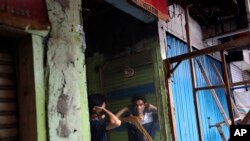Indonesia, despite a growing coronavirus caseload, has avoided locking down population centers in favor of softer control measures to sustain an economy already stressed by poverty.
The virus hitting most of the world now has sickened 3,293 people in Indonesia and killed 280. On Friday, the capital Jakarta ordered a two-week closure of offices, and banned gatherings of more than five people but did not issue a stay-at-home order and allowed some public transit to keep running. Schools and restaurants had been closed already.
Although the order extends to an urban area of about 30 million people, other parts of the archipelago, including its mines and palm farms, are unaffected. About 265 million people live across Indonesia’s 13,000 islands.
Officials must mind their country’s poverty rate of nearly 10 percent, analysts said, since business closures hurt incomes. Yet to ignore the deadly virus would let it spread and strain hospitals in rural areas.
“If we get to the point where they have to go into total lockdown like India, or Malaysia, then the economic impact will be much greater,” said Rajiv Biswas, Asia-Pacific chief economist at IHS Markit. “There’s a lot of downside risk for Indonesia right now.
“Many people live on the poverty line or below the poverty line in Indonesia,” he added.
As it is, Indonesia’s GDP should grow 3 percent this year rather than about the 5 percent expected at the start of 2020, said Anushka Shah, vice president with Moody's Sovereign Risk Group in in Singapore. Limited forced closures will keep mines, farms and factories running, Shah said. Indonesia exports palm oil, coal, rubber and minerals.
But Shah expects a fall in Indonesian exports, along with their prices, because of a slump in demand from overseas where hundreds of millions of consumers are locked down and without jobs.
“The shape and form that the government measures take with regard to potential shutdowns will determine production, but then a lot also depends on demand, because global demand has meaningfully slowed, and you’ve also seen a fall in prices,” Shah said.
Relatively light containment measures will send a message to people that the coronavirus spread isn’t too severe, warned Philips Vermonte, executive director of Jakarta-based research organization Centre for Strategic and International Studies.
Complicating the situation, in most years Indonesians travel in large numbers to their hometowns for the Ramadan holiday, which begins later this month, a movement that could make more people sick, Vermonte added. “In some corners, people will lose their guard & think it’s OK -- and they’re (disease) carriers,” he said.
“I think the first thing that came to the mind of the government back in March was the economy, and probably they were thinking the emergency wasn’t there at that time,” he said. COVID-19 cases began growing noticeably in mid-March.
Now the central and local governments worry that hospitals and doctors lack the capacity to handle a spiraling caseload, Vermonte said.
Indonesia has announced a total $8.725 billion in stimulus to ease economic losses.
The Southeast Asian country’s current account and budget deficits are low, good for absorbing economic shocks, Moody’s said in an April 3 research note. But weak "debt affordability" could challenge the government later to assuage economic damage, the note said.
The poor may just leave Jakarta. A lot are migrant workers who sell from the street sides to offices and schools, said Paramitaningrum Supamijoto, international relations lecturer at Bina Nusantara University in Jakarta.
“Closing the stores, closing the offices, closing the schools will affect their income, especially if you are selling food, selling goods,” Supamijoto said. “Nobody is going out, or they prefer (to) order by online.”
If the migrant workers go home, she said, they risk spreading the virus from Jakarta to the rest of Indonesia.
Around Jakarta, most retailers had already closed as of early Friday and people were staying home whenever possible, including attending classes online, Supamijoto said. Muslims still pray at mosques however, she said, and malls with supermarkets or drugstores remain open.
